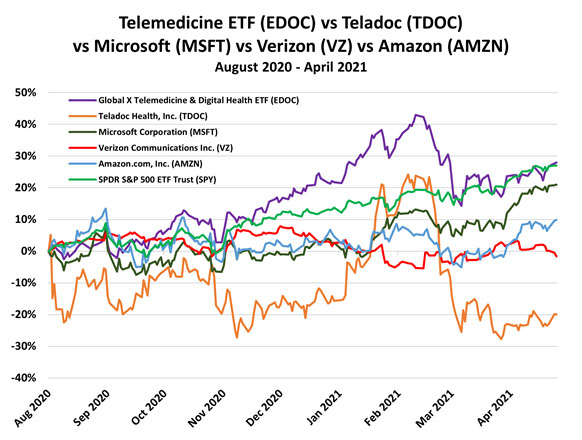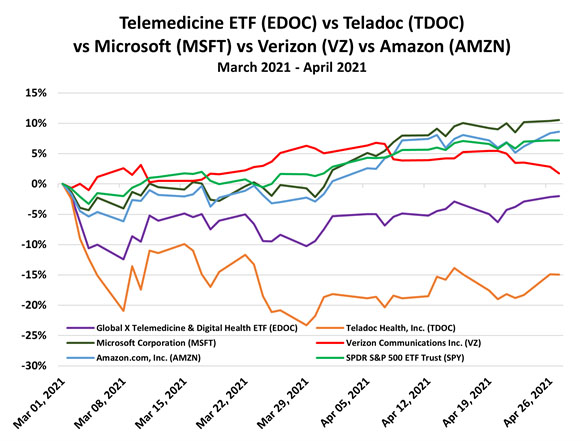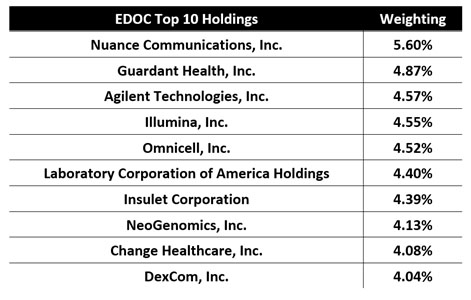US company focused but good info on the sector. GLTA
Telehealth funding in the first quarter almost doubled from the same quarter a year ago. Big tech companies such as Verizon, Microsoft and Amazon are taking notice, striking deals to solidify themselves in the booming industry. The telehealth market is poised to grow to $560 billion by 2027, and there is no shortage of players trying to claim their slice of the pie.
COVID-19 Thrust Telehealth into the Spotlight
As MRP noted last summer, COVID-19 thrust telehealth into the spotlight when it became clear the industry was poised to benefit from the early stages of the lockdown. Now, it appears telehealth is primed for another leg-up.
New data from FAIR Health's Monthly Telehealth Regional Tracker shows that across the U.S., telehealth claim lines jumped 2,417% in December 2020 from the same month a year prior. As a percentage of total medical claims, telehealth rose from 0.22% to 6.1% over that same period.
A 2020 consumer survey showed that number of people who use telehealth services doubled, from only 39.4% before the pandemic to 79.5% post-quarantine. Not only do virtual visits simplify at-home care, but they will help alleviate a potential shortage of doctors, as the U.S. expects to be short 55,000 primary care doctors by 2030.
Consulting firm McKinsey and Company estimates that at least 25%, or $250 billion, of all Medicare, Medicaid and commercial outpatient, office and home health spend could be done virtually.
According to a recent survey, 73% of physicians would like to continue utilizing telehealth services to conduct chronic-health related appointments. 63% of physicians also highlighted technology concerns for their patients to conduct these appointments, illustrating the continued need for technology companies to invest in the growing telehealth industry.
Investment Continues to Shatter Records
A record $81.6 billion was invested in healthcare across the globe in 2020, and now 2021 is shaping up to be another banner year for the industry. In the first quarter alone healthcare funding reached $31.6 billion, the highest quarter on record.
Telehealth on its own has seen immense growth. A new report from CB Insights showed telehealth investment reached an all-time high of $4.2 billion in Q1 2021 across 139 deals in the sector. Per HealthcareDive, funding for mental health, another major use of telehealth services, jumped 54% to $825 million, illustrating the fact that funding won't fade as the pandemic slows and life gets back to normal.
"Mega-deals" in the industry are red hot, as 25 companies raised over $100 million in the first quarter of 2021, compared with only 40 mega deals in all of 2020. Funding has driven digital health companies such as Hinge Health and K Health to "unicorn" status as they've eclipsed the $1 billion valuation mark.
Verizon, Microsoft and Amazon Take Notice
Tech companies such as Verizon, Microsoft and Amazon are quickly striking deals and building platforms to tap into the industry. The Wall Street Journal called the recent surge of telehealth deals the "next battleground for technology giants," as the need for improved technology in healthcare accelerates.
Verizon recently launched Bluejeans Telehealth, in which the collaboration strives to simplify the digital connection and expand virtual care offerings. According to Verizon's own research, 81% of healthcare organizations expect to see steady growth in healthcare investment over the next two to three years. Verizon's launch could spur other telecommunications companies to dive into the telehealth sector and capitalize on these trends.
Last week, Microsoft made waves across the healthcare industry by acquiring Nuance Communications in a $19.7 billion deal, the second largest acquisition ever for Microsoft.
The purchase of Nuance, a software company focused on speech recognition through artificial intelligence applications, is the beginning of a larger venture called the "Microsoft Cloud for Healthcare." Jeffries analyst Brent Hill calls it "one of many steps" for Microsoft to solidify its position in the industry. Currently Nuance utilizes AI to power several products, including one that listens in on exam room conversations between physicians and patients and automatically writes up the doctor's recommendations. Microsoft plans on incorporating this technology with its Teams application for business communications.
The deal also allows Microsoft to get in the ground floor and sell its technology to healthcare customers working through the sudden telehealth boom. Nuance is well connected in the industry, as Forbes reports 55% of physicians, 75% of radiologists and 77% of U.S. hospitals utilize Nuance solutions, giving Microsoft an immediate client base.
Amazon, unsurprisingly, has also pushed further into the healthcare industry. The Wall Street Journal recently reported Amazon would be expanding its telehealth services nationwide and opening their services to other firms. After previous healthcare pursuits, including its pharmacy offerings and Covid-19 pop-up testing sites, the telehealth push makes it clear that Amazon is serious about its healthcare ambitions.
These tech companies enter a crowded field with current players such as Teladoc, MDWell and Cigna, which currently have 200 million customers in the U.S. combined. However, with the boom in demand and funding, there may be enough space for everyone to get their share of the market.
What the Future Holds
The global healthcare market is expected to reach roughly $11 trillion by 2022. Telehealth is projected to grow from a $61 billion market in 2019 to a $560 billion market by 2027. The growing relationship between big tech and healthcare companies should not only accelerate this trend, but allow healthcare providers to be more efficient and effective.
With the recent rise of SPACs (128 SPACs went public in the first 40 days of 2021), the telehealth industry should see no shortage of public interest. In the first quarter of 2021, U.S. SPACs raised $83.1 billion, which was more than the $82.6 billion raised in all of 2020. At least 10 digital health companies announced or closed plans to go public via SPAC in the first quarter.
Investors can gain exposure to telehealth via the Global X Telemedicine & Digital Health ETF (EDOC). Companies investing in technologies improving remote access to healthcare services include Teladoc (TDOC), Microsoft (MSFT), Amazon (AMZN), Verizon (VZ).



Originally published April 28, 2021.
 McAlinden Research Partners (MRP) provides independent investment strategy research to investors worldwide. The firm's mission is to identify alpha-generating investment themes early in their unfolding and bring them to its clients' attention. MRP's research process reflects founder Joe McAlinden's 50 years of experience on Wall Street. The methodologies he developed as chief investment officer of Morgan Stanley Investment Management, where he oversaw more than $400 billion in assets, provide the foundation for the strategy research MRP now brings to hedge funds, pension funds, sovereign wealth funds and other asset managers around the globe.
McAlinden Research Partners (MRP) provides independent investment strategy research to investors worldwide. The firm's mission is to identify alpha-generating investment themes early in their unfolding and bring them to its clients' attention. MRP's research process reflects founder Joe McAlinden's 50 years of experience on Wall Street. The methodologies he developed as chief investment officer of Morgan Stanley Investment Management, where he oversaw more than $400 billion in assets, provide the foundation for the strategy research MRP now brings to hedge funds, pension funds, sovereign wealth funds and other asset managers around the globe.